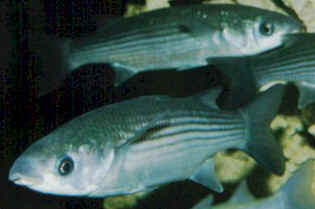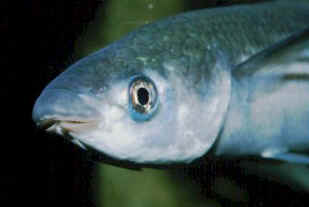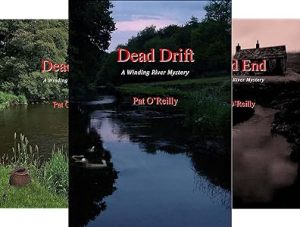Crenimugil labrosus - Grey Mullet
Phylum: Chordata - Class: Actinopterygii - Order: Perciformes - Family: Mugilidae

There are over one hundred mullet species in the world, but few appear around the coasts of Britain. In Wales, the thick-lipped grey mullet is the most common species
Thick-lipped grey mullet are very common in estuarial waters, often running up to near the tidal limit, where the salinity is very low. These are unusual fish in that they swallow mud and digest the small creatures it contains.
Thick-lipped mullet can grow to about 4.5kg (10lb) in British waters and are very strong fighters for their weight. Like bass, they are slow growers, and a 6lb mullet is likely to be at least fifteen years old. The Welsh rod-caught record thick-lipped grey mullet weighed 14lb 3oz (approx. 6kg) and was caught from a boat off Aberthaw, in South Wales.
Small mullet should always be returned carefully to add to the breeding stock. (In fact there is little interest commercially in mullet for food, although some anglers know how to cook them and produce a nice meal.)

Ground baiting with bread, chopped fish or other cloudy bait will keep these shy fish near to you as long as you avoid sudden movements. Bread flake is an effective hook bait, as are small pieces of fish. A drop net is advisable if you are fishing from a pier or other high vantage point, because usually only a weak hook-hold is obtainable in the jaws of a mullet.
The much less common thin-lipped grey mullet is very similar in size and general appearance; apart from its thinner lips and bristle-like teeth on its upper lip, the thin-lipped mullet is distinguished by a dark spot at the base of the pectoral fins and a wider slit beneath the throat.
Excited by rivers and streams? So are we, and we're pretty sure you would find the Winding River Mystery trilogy of action-packed thrillers gripping reading too. Dead Drift, Dead Cert, and Dead End are Pat O'Reilly's latest river-based novels, and now they are available in ebook format. Full details on our website here...
Buy each volume in ebook format for only £2.47 on Amazon... Paperbacks also available on Amazon at £6.95 each. All proceeds go towards keeping the First Nature website online.
Please Help Us: If you have found this information interesting and useful, please consider helping to keep First Nature online by making a small donation towards the web hosting and internet costs.
Any donations over and above the essential running costs will help support the conservation work of Plantlife, the Rivers Trust and charitable botanic gardens - as do author royalties and publisher proceeds from books by Pat and Sue.
